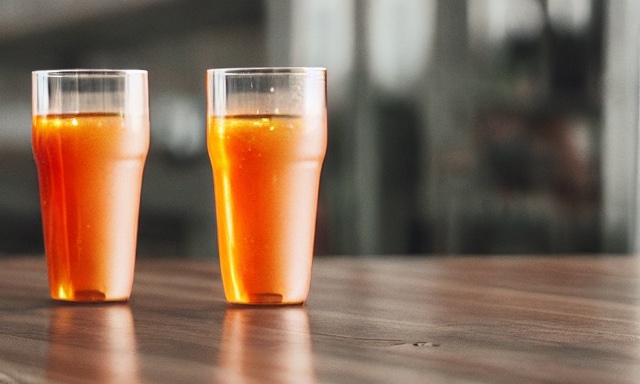Internet Asks: “How Much Caffeine in a Monster?”
Ever felt like you could use a little boost to tackle that last set of weights at the gym, power through a late-night study session, or simply beat the midday slump? Enter Monster Energy, the vibrant green can promising to unleash the beast within you! But, what's the caffeinated kick behind this popular energy drink? Stick with us as we reveal the mighty caffeine content lurking in your can of Monster Energy.
sponsored links

The Caffeinated Core of Monster Energy
Monster Energy isn't just a fizzy beverage. It's a cocktail of energy boosters, and its primary source of pep comes from caffeine. A standard 500ml can of Monster Energy contains a mighty 150 milligrams of caffeine. That's roughly equivalent to about two 8-ounce cups of coffee or four cans of cola.
Comparing the Beasts: Monster Vs. Coffee
If you're a caffeine aficionado, you might be wondering how Monster stacks up against our beloved bean juice – coffee. A standard cup of coffee (8 ounces) usually contains between 95 to 100 milligrams of caffeine. This means that the caffeine content of Monster Energy is akin to a moderate to strong cup of coffee. However, remember, caffeine is not the only stimulant found in Monster Energy. Here are the other ingredients in Monster Energy that contribute to its energy-boosting effect:
- Taurine: Taurine is an amino acid, which are the building blocks of proteins. Some studies suggest it can improve athletic performance.
- Glucose: Similar to sugar, glucose is a type of sugar that provides a quick source of energy for your body. It is absorbed directly into the bloodstream during digestion.
- B Vitamins: Monster Energy contains Niacinamide (Vitamin B3), Pyridoxine Hydrochloride (Vitamin B6), and Riboflavin (Vitamin B2). B vitamins are crucial for energy production as they help convert dietary energy into ATP (adenosine triphosphate), the form of energy that your body uses.
sponsored links
The Energy Effect: Caffeine Consumption Considerations
While Monster Energy can give you that rush of energy you crave, it's essential to moderate your intake. The FDA suggests a maximum of 400 milligrams of caffeine per day for most adults – that's about two and a half cans of Monster Energy. However, everyone's caffeine tolerance varies, and some people might experience side effects like jitters, restlessness, or sleep disturbances with lower intakes.
Consulting the Monster Manual: Dietary Disclaimers
Before you crack open a can of Monster, remember that although it might boost your energy levels, it's not a substitute for good nutrition or adequate sleep. It's always a good idea to consult with a healthcare professional before making significant changes to your caffeine intake or if you have any specific health concerns.
Conclusion: Taming the Monster
While Monster Energy can give you that quick pick-me-up, it's essential to understand the caffeinated power packed in each can. By being aware of the caffeine content and other stimulants in Monster Energy, you can ensure you're harnessing the beast responsibly. Drink smart, stay energized, and conquer your day!
Disclaimer: This article is for informational purposes only. Always consult a healthcare provider before making significant changes to your diet or lifestyle, particularly if you have health concerns or conditions that might be affected by caffeine consumption.
sponsored links
References
- Monster Energy. (n.d.). Monster Energy Original. https://www.monsterenergy.com/products/monster-energy/monster-energy
- U.S. Food and Drug Administration. (2018). Spilling the Beans: How Much Caffeine is Too Much? https://www.fda.gov/consumers/consumer-updates/spilling-beans-how-much-caffeine-too-much
- Mayo Clinic. (2021). Caffeine content for coffee, tea, soda and more. https://www.mayoclinic.org/healthy-lifestyle/nutrition-and-healthy-eating/in-depth/caffeine/art-20049372
- National Center for Biotechnology Information. (n.d.). Taurine. https://pubchem.ncbi.nlm.nih.gov/compound/Taurine
- National Institutes of Health Office of Dietary Supplements. (n.d.). B Vitamins. https://ods.od.nih.gov/factsheets/list-all/#V
People are also reading...
Does Sprite Have Caffeine?
Calories In Steak?
Chicken Taco Calories?
Does Hot Chocolate Have Caffeine?
Are Carrots Acidic?
Are Mangoes Acidic?
Orange Juice pH?
Does Kahlua Have Caffeine?
Calories In a Grilled Cheese?
Is Watermelon Acidic?
6 oz Steak Calories?
Are Strawberries Acidic?
Ready to level-up?
Create meal plans 10x faster, follow up with your clients through our mobile app, and never struggle with meal planning or recipe management again.